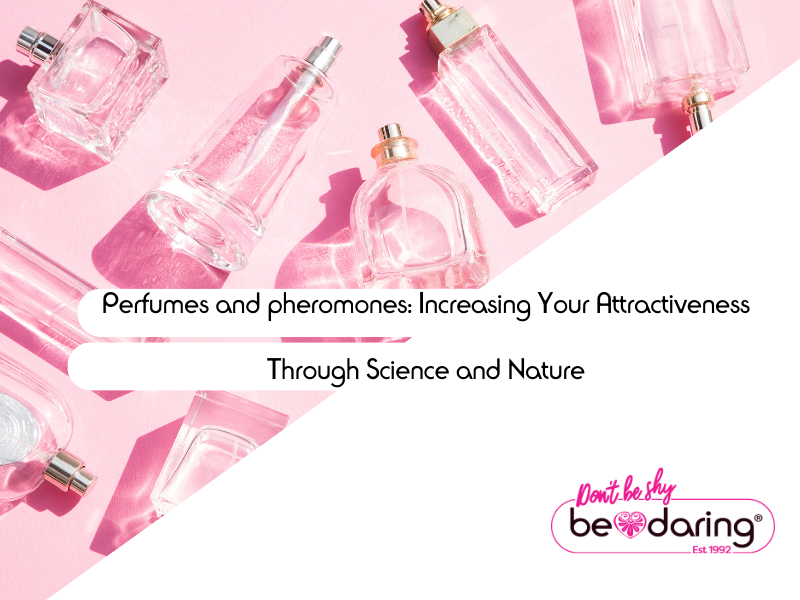Perfumes and pheromones: Increasing Your Attractiveness Through Science and Nature

Ah, the art of perfumery! It's a fascinating story that has enthralled humanity since the beginning of history. Let us travel back in time together and waltz through the perfumed annals of history.
Our narrative begins in ancient Mesopotamia, when the origins of perfume (a term borrowed from the Latin 'per fumum', meaning 'through smoke') were first documented. The Mesopotamians were incense connoisseurs, utilising it for both religious and medical purposes.
As the ages passed, the Egyptians refined the skill, including scents into their spiritual practices and daily rituals. They believed in the ability of scent to connect with the divine; to them, a pleasant aroma was the gods' own breath.
The Greeks and Romans: Fragrance Aficionados
Fast forward to ancient Greece and Rome, where perfume was no longer merely an ethereal adornment but a necessary component of their cultures. The Greeks held perfumes in high regard, utilising them in public baths and sporting events - yep, even their Olympic Games included a splash of eau de parfum!
The Romans, on the other hand, took things to the next level. They sprayed perfume on not only themselves, but also their homes, dinner courses, and horses. Consider attending a feast where the aroma of the dishes is mixed with the scent of roses; a powerful, seductive experience to be sure!
The Middle Ages and Renaissance: Aromatic Alchemy
During the Middle Ages and Renaissance periods, perfume was studied through the lenses of alchemy and medicine. It was thought to protect against sickness and ill fortune. Unfortunately, this notion was not corrected until the Bubonic Plague, during which perfumed masks were employed in vain to ward off the epidemic. But everything wasn't doom and gloom. The Renaissance was also a period of extensive exploration and discovery. New trade routes brought exotic spices and scents from India, the Middle East, and the Far East to the heart of Europe, transforming the perfume industry.
Modern Perfumery: A Molecular Dance.
The late nineteenth century saw the development of synthetic scent chemicals, which paved the way for modern perfumery. Perfumers were suddenly given a completely new set of scents to work with. This signified a change from natural to synthetic perfumes, but it also created an ongoing debate: natural vs synthetic, tradition vs innovation.
Today, fragrance is a delicate dance of molecules, combining tradition, science, and invention. From the sustainable fragrance movement, which promotes environmentally responsible practices, to the search for the ideal aphrodisiac aroma, our olfactory trip continues.
So, dear reader, we find ourselves in the present, in a world where scents have surpassed their original purposes, becoming statements of identity, mood, and desire. A world in which the enticement of a perfume might inspire a conversation, a memory, or a passionate romance. The art of perfume is a true monument to the power of aroma, as well as to the science of attraction.
The Role of the Olfactory System in Attraction
Have you ever noticed how a certain fragrance can send you off on a tornado of memories, emotions, and desires? That's not a mental quirk; it's the magic of your olfactory system in action. When it comes to attractiveness, this system serves more than simply a supporting function.
The olfactory system is our body's own'scent-ient' system, so to speak. It is made up of the nose, the olfactory bulb, and the brain, and it is responsible for deciphering the numerous odours we experience on a daily basis. From the fresh perfume of morning dew to the comforting aroma of homemade soup, our olfactory system creates a rich sensory image for us.
But let's get back to the heart of the matter: attraction. How does the olfactory system fit into this romantic equation?
The Smell of Love: On a biological level, we are predisposed to be drawn to specific smells. These are derived from pheromones, which are chemical signals generated by one individual that may be detected by others of the same species. They are like invisible love messages, whispering sweet nothings to our olfactory system. Studies have revealed that these pheromones play a role in human attraction, while the specific details remain unknown.
Memory and Emotion: Our olfactory system is inextricably linked to the limbic system, the area of our brain responsible for memory and emotion. This means that specific odours might elicit strong emotional responses and memories. Have you ever caught a breath of a scent and been whisked back to a first date or a special kiss? This is the force of scent-memory at play.
Natural Perfume and Personal Preference: Pheromones and memories can influence our choices, but personal taste also plays a role. This is where the art of fragrance comes in. Natural perfumes have a distinct attraction due to their combination of natural components and expert crafting. The correct ecological fragrance can resonate with our olfactory system, resulting in an irresistible draw.
So, the next time you get a whiff of a tempting smell, realise that it isn't simply perfume. It's a scientific symphony, a ballet of desire, and a demonstration of your olfactory system's strength.
Perfumes and Pheromones: The Chemistry of Attraction
Have you ever wondered why a certain scent can make your heart race, or how a breath of a particular perfume can transport you back in time? Well, my dear reader, this is all about the wonderful and intriguing realm of chemistry.
Perfumes and pheromones play important roles in the complex dance of attraction. The natural perfume we put on our skin and the natural pheromones we emit have a significant impact on our interpersonal connections. They are the unsung heroes in the search for love and connection.
The limbic system of our brain is at the heart of this, as it is responsible for memory and emotion.
Scents take the front stage here, as they can bypass the reasoning brain and directly affect our emotional responses. This explains why a scent may elicit such strong emotions and memories. We're looking for more than just a sustainable fragrance; we want one that speaks to our very core.
But let's dig a bit deeper, shall we? There's a whole world of science behind this charm of perfumes and pheromones.
The Chemistry of Perfumes
Perfumes are a complex blend of fragrant essential oils, scent chemicals, and solvents. The combination and concentration of these ingredients determine the distinct qualities of each perfume. High-quality, natural perfumes frequently include a diverse array of natural essential oils, each providing a new layer of complexity and attraction to the aroma.
However, how we experience a perfume is determined by the volatility of the aroma molecules, or how quickly they evaporate. Top notes are the most volatile, striking our senses initially and vanishing rapidly. The middle or heart notes appear next, and the base notes, which are the least volatile, last the longest, anchoring the smell.
The Science of Pheromones
What about pheromones? Our bodies naturally produce invisible chemical signals that transmit social and sexual cues to others. For decades, scientists have researched pheromones and their profound influence on animal behaviour, and the results have been fascinating.
Though it remains a controversial subject of study in humans, some research suggests that our natural pheromones may influence how others see us, as well as our own mood and confidence. It's like a secret language, murmured beneath the surface of our conscious awareness. The dance of attraction is a complicated ballet of chemistry and emotion. Perfumes and pheromones are the silent players, whispering in the wings, pulling strings, and gently changing our dance partners' perceptions.
So, the next time you inhale an enticing aroma or experience an unusual attraction, consider the silent symphony of molecules at work.
How Do Pheromones Work to Attract People?
In the grand dance of attraction, pheromones take centre stage. These unseen, odourless molecules, secreted by our bodies and released into the air, communicate in a silent language of attraction that bypasses the conscious mind. They are the sneaky messengers of yearning, the whispers in the night that bring us closer. But how do they operate, you ask?
Here's the exciting part: they aren't perfumes in the traditional sense, but they do play an important role in the natural perfume of attraction. They are chemosensory signals sent by our bodies and received by the Vomeronasal Organ (VNO) located within the human nose. The technique is similar to a hidden Morse code, as it sends out messages of attraction to others surrounding.
Step 1: Secretion.
It starts with secretion. Pheromones, like invisible messages in a bottle, are released into the air, most typically via sweat or other human fluids. However, it is not the normal "sweaty smell"; pheromones are odourless to the human nose. The dance begins with the initial steps, which we take unconsciously.
Step 2: The Reception.
Once dispatched, these odourless messengers travel to potential partners. They go through the air like a guided missile in search of a VNO that will accept their message. This is where the magic occurs.
Step Three: The Interpretation
If the VNO recognises the pheromone (not all pheromones are universal), it sends a signal to the hypothalamus, a brain area that controls, among other things, our basic drives. The signal does not say, "This person smells good," but rather, "There's something about this person; pay attention."
So that's the science of it, minus the romance and attraction.
But let us not overlook the poetry of it all. This complicated ballet of pheromones emphasises the exquisite complexity of attraction. It's a quiet sonnet written in chemical language, reminding us that science has a place in the world of love as well.
And when it comes to sustainable scent, this understanding is even more powerful.
Understanding the significance of pheromones allows us to better appreciate the charm of natural perfume—the invisible, intangible, irresistible enchantment that brings us closer together.
It serves as a reminder that in the big dance of attraction, each note, whisper, and silent signal contributes to the symphony of desire.
Myths and Misconceptions: Separating Fact from Fiction
Natural perfume is maybe the most enigmatic and mythical commodity. The idea that a smell has the ability to attract or repel is firmly engrained in our collective awareness, and while some of these beliefs are true, many others are completely false.
One such myth is that perfume functions directly as a pheromone, which is a chemical communication that causes a social reaction in individuals of the same species. While it is true that certain perfumes can mimic the natural aromas linked with attraction, the mechanics are not as simple as popular culture makes us assume.
The truth is that perfumes do not contain human pheromones and do not function by mimicking them. Instead, a good perfume works by enhancing our natural scent and making us more noticeable to others. Fragrances can influence perception and attraction, but this is more about personal preference than biological imperative.
Myth 1: Perfumes contain human pheromones.
One of the most common misunderstandings about natural perfumes is that they contain human pheromones. This statement is more fiction than fact. As our opening quote stated:
While many perfumes are intended to enhance one's natural aroma, they do not include human pheromones. They are instead a combination of essential oils, aromatic chemicals, and fixatives that provide a distinct scent.
Myth 2: Perfumes are aphrodisiacs.
Another common perfume misconception is that wearing a sustainable fragrance can increase your attractiveness to the opposite sex. While it is true that various fragrances can elicit specific feelings or memories, as well as make you more apparent, there is no scientific evidence that they act as aphrodisiacs. So, rather than searching for a scent that will make you irresistible, go for one that complements your own style and makes you feel confident.
Myth 3: Perfume Preferences Are Biologically Determined
There is a widespread assumption that our perfume choices are physiologically motivated, that we are naturally drawn to specific scents. Fragrances can influence perception and attraction, although this is due to personal preferences rather than biological imperatives.
Our preferences for different odours are influenced by a variety of factors, including our personal experiences, cultural background, and current mood. So, while you may enjoy a specific natural perfume, someone else may not.
The appeal of perfume as an aphrodisiac
Despite these myths and misconceptions, perfume is undeniably appealing as an aphrodisiac. The relationship between aroma and attractiveness is widely established; a pleasant fragrance can make the person more appealing to others. However, it is the person wearing the perfume that attracts others, not the perfume itself.
Perfume is not a magical potion. It does not make us irresistible; rather, it enhances our allure. The right perfume may make us feel confident, sexy, and ready to face the world. but, in the end, it's the person behind the fragrance who wins hearts.
So, while natural scent may not be the powerful love potion that it is frequently portrayed to be, it can undoubtedly influence attraction. The goal is to choose a fragrance that matches your natural aroma and expresses your distinct individuality. That's the true science of attraction.
5 Top Natural Ingredients for Attracting Others
Have you ever wondered why a certain perfume causes your heart to race? It is not an accident, sweetie; it is science. The power of aroma is profoundly ingrained in our DNA; a tantalising natural perfume can function as a powerful aphrodisiac. But what are the most alluring plant ingredients? Shall we go exploring?
- Lavender
Oh, Lavender! Its calming fragrance is more than just a sleep aid. This scented gem has been utilised since antiquity due to its relaxing and calming qualities. But did you realise it is also a strong attractor? According to a study published in the Journal of Natural Medicinal Chemistry, lavender helps us spend more time with others. So, the next time you're feeling lonely, try dabbing some lavender on your pulse points and seeing what happens.
- Vanilla
Vanilla! Sweet vanilla! It's not just for baking cookies; it's the perfume industry's equivalent of the little black dress. A study published in the Proceedings of ISOT/JASTS discovered that vanilla elicits sensations of joy and relaxation. Furthermore, the sweet, creamy aroma of vanilla is widely associated with comfort and warmth. It's a perfume that draws people in and puts them at rest, much like mama's handmade cookies.
- Sandalwood
Sandalwood is the strong, silent type; it communicates effectively without saying much. This woodsy note has a long history in the fragrance industry, and it is frequently utilised as a base note to anchor other, more volatile, olfactory ingredients. The rich, warm aroma of sandalwood can increase the release of oxytocin, also known as the 'love hormone.' So, if you want a long-lasting fragrance that will turn heads, sandalwood is your best option.
- Jasmine
If scents were people, Jasmine would be the life of any party. This remarkably gorgeous floral perfume is known for eliciting emotions and exciting the senses. Its aphrodisiac properties are supported by research; a study in the Journal of Health Research discovered that breathing jasmine can boost beta waves in the brain, resulting in increased alertness and mood elevation. Who could resist that?
- Ylang Ylang
Ylang Ylang, sometimes known as the Flower of Flowers, is the fragrance industry's underdog. Despite its relative obscurity, this exotic fragrance is a powerful aphrodisiac. Its distinct fragrance profile - sweet, slightly fruity, with a hint of spice - has been proved to heighten attraction and desire. So, if you're in the mood for some mystery and allure, Ylang Ylang is the natural perfume ingredient for you.
















